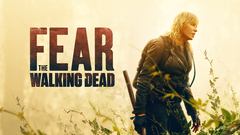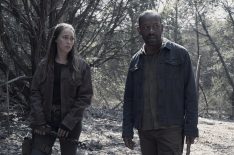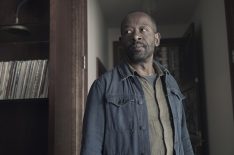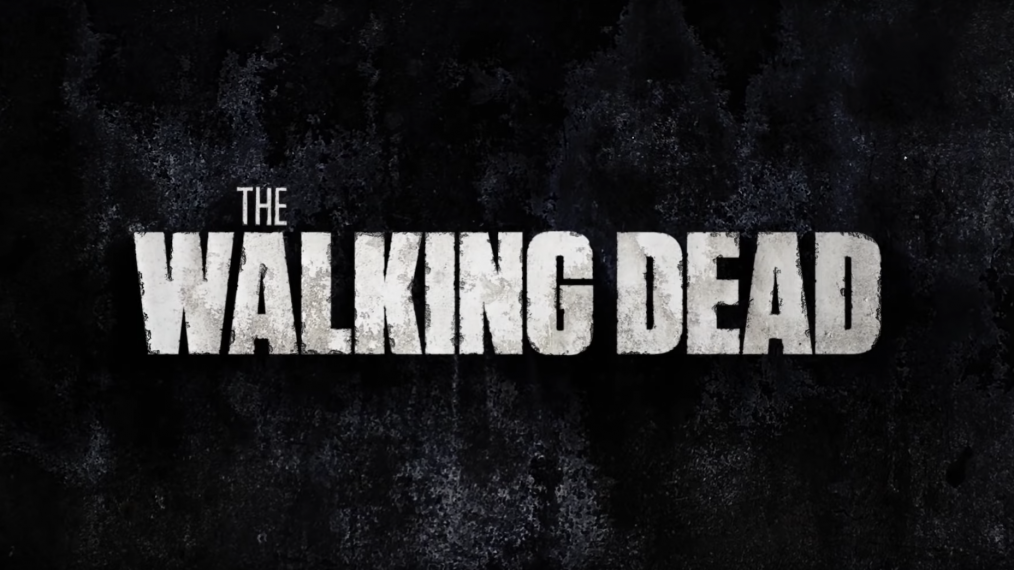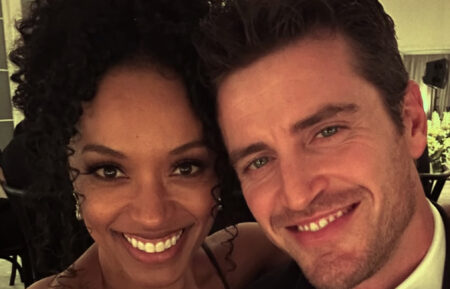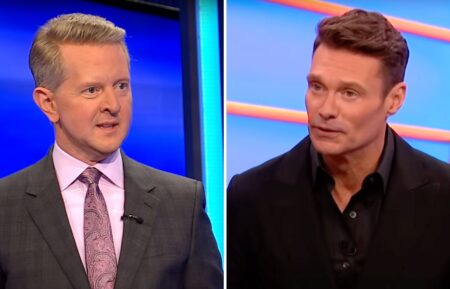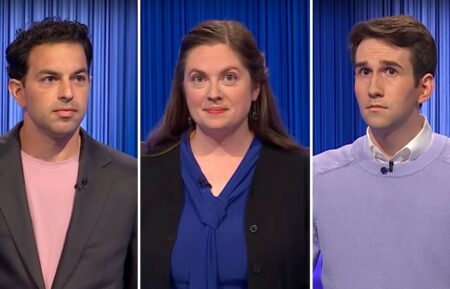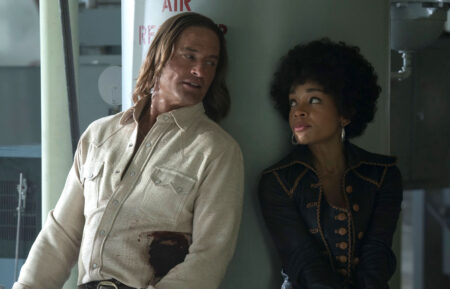‘Fear The Walking Dead’ Showrunners on Alicia’s Journey, Morgan’s Mentorship & Season 4B’s ‘Very Different’ Antagonist
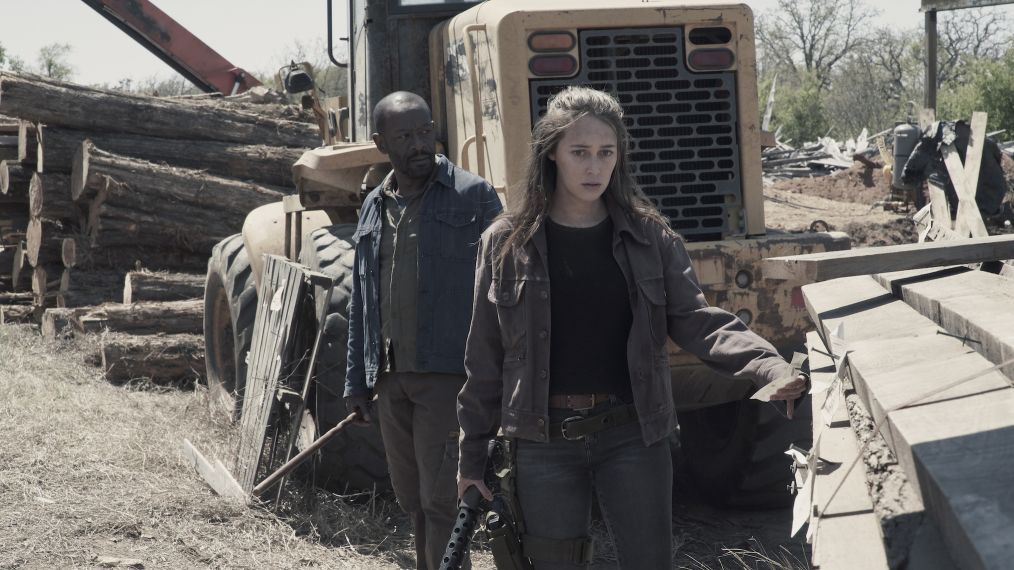
Spoiler Alert
The promised walker-nado on AMC’s Fear The Walking Dead has arrived.
Sunday’s premiere featured more than just the undead flying through midair and torrential downpours, though; it saw several characters at some of the lowest points they’ve reached on the show, and forced them to contemplate their humanity, their relationships and even their alcoholic beverages. (Looking at you, Strand.)
Showrunners Andrew Chambliss and Ian Goldberg broke down how “People Like Us” affected each of the characters, how the ragtag band of survivors will move forward after their devastating losses and an antagonist that’s “unlike any that we’ve seen before.”
Why does Morgan choose to mentor Alicia and keep encouraging her, even when she pushes him away?
Andrew Chambliss: I think Morgan sees a bit of himself in Alicia. He is someone who has lost his family, he lost his wife and son and other people he became very close with, and Alicia is in a similar place. She has lost her mother and her brother, and she is rudderless. She is searching for a way to live in this world, a way to make up for all the dark things she’s done, and Morgan is just trying to be there for her in the best way he knows how. And even though Alicia thinks she’s kind of following her mother’s footsteps, Morgan sees that she has kind of isolated herself from the people closest to her. He’s trying to help her see that. But ultimately, I think it gets into a very interesting place where Alicia turns that around on Morgan, “You’re doing the same thing…you’re leaving.” And in a very interesting way, Alicia is actually the one asking Morgan a question he hasn’t even asked himself, though he needs to.
How does being unable to help the man in the lumber mill affect Alicia? Was she using that mission to avoid her grief?
Ian Goldberg: I think the thing that’s really driving Alicia in this episode and her tireless journey to find where these “help” notes are coming from, is that she’s trying to carry forward Madison’s legacy. She’s looking for meaning in her life, she feels disconnected from everyone, we see she’s not even living in the same house as Strand and Luciana, who are the closest links she has to her original family. So really, she just throws herself into this mission of helping someone — she doesn’t know who they are or where they are, initially, but that is something that Madison would have done.
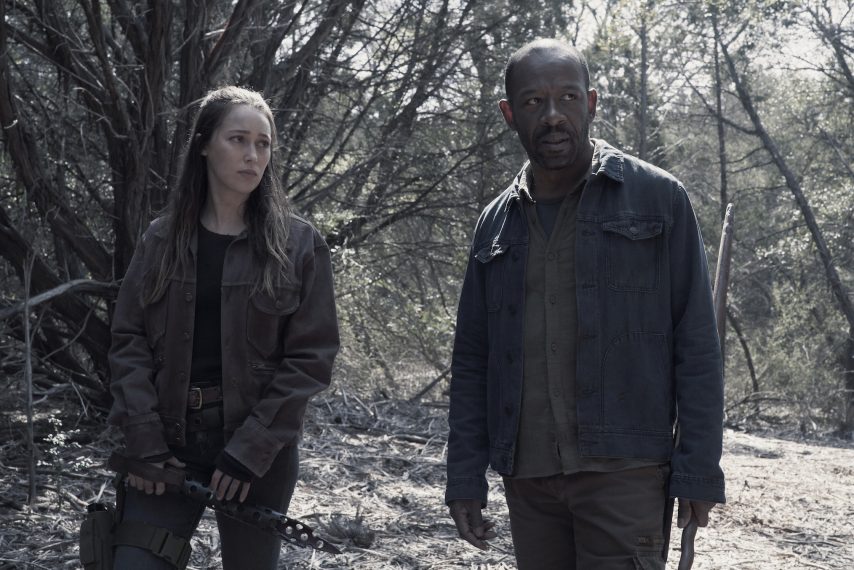
When Alicia finally gets to the lumber mill and sees that the person who needed their help has already died and turned, it’s a huge blow for her because it makes her realize that she failed. She couldn’t save the person, and it leaves her reeling, wondering, “If I can’t be Madison, if I can’t be my mom, then what can I be? And what am I going to do now, that I’m so disconnected from everyone?” That’s going to be a big thing pushing her forward, as we go forward in the back half of the season, is Alicia searching for her identity and her purpose with the new circumstances she’s in.
What can you tell me about that strange box filled with supplies?
Chambliss: We won’t say much — we will say that box is going to be very important to the back half of the season, and that probably won’t be the last one that we’re going to see.
This episode offered a brief glimpse at Al’s past, when she mentioned her mom. Will we learn more about who she was before the turn?
Goldberg: We’re going to learn more about who Al is. We’ve seen time and again that Al is someone who is better at asking the questions than answering them. She kind of plays things close to the vest, but there’s going to be episodes where Al is going to be vulnerable in ways that she hasn’t been before, and that’s going to force her to reveal things about herself that she might not have otherwise.
It’s pretty clear this episode that Charlie isn’t in a great place; she’s not talking, she barely runs away from the walker at the river, etc. What can you say about her headspace?
Goldberg: Charlie has been through a lot for anyone, but when you think about the fact that she’s a child, having gone through everything she has, it’s really incredible that she’s able to carry forward. There’s tremendous guilt and sadness inside Charlie, and I think you see that in the scene where John Dorie tries to appeal to her over a Scrabble game, because he senses that she’s punishing herself somehow, that that guilt is manifesting as self-punishment.
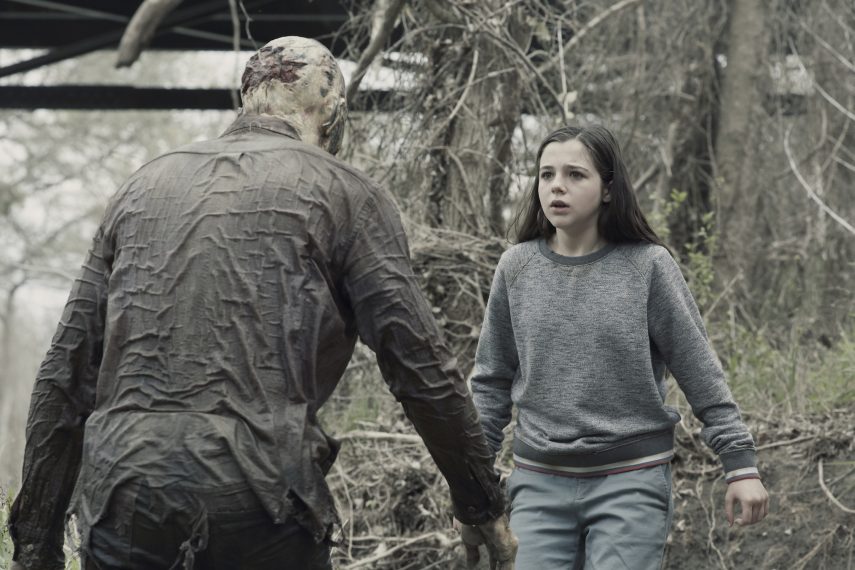
He understands that because he did the same thing once, after accidentally killing someone with his six-shooters. And he talks about how it took someone like June to bring him back to the world and shine a bit of light into his life, and that’s a thing that Charlie doesn’t have. And she’s going to be wrestling with that and searching for that in the back half of the season, and we’ll see if she’s able to move past that and forgive herself.
Luciana had an interesting encounter with Charlie. Can you talk a little bit about what finding that book meant to her?
Goldberg: When Luci initially saw someone was in the house and saw it was Charlie, she was still in a place where she thought Charlie might be there to hurt her. I mean, Luciana watched Nick die. She held him in her arms as he bled out, and she wasn’t able to do anything to comfort him. So I think we can understand why her initial reaction was to chase Charlie out of the house. But when she goes back and sees Charlie left that The Little Prince book there, she realizes Charlie was making an overture of peace to her. The Little Prince is an interesting book in and of itself, it’s the story about a child wrestling with the adult world, and that’s very evocative of where Charlie is and I think it’s Luciana kind of realizing all of that, and that’s the thing that drives Luciana out into the storm to try to find Charlie. Whether she will, that’s a question we’ll answer as we get deeper into the season.
Heading back to Alexandria was a big plot point in this episode. Might we eventually see “Team Morgan” combine with “Team Rick”?
Goldberg: Morgan’s journey on Fear The Walking Dead has just begun, and we have a lot more story that we’re planning for him on Fear. So for us, what’s really interesting is Morgan’s motivation and why he’s talking about going to Alexandria. Why that’s a journey he would want to take at this juncture, because we saw him at the beginning of Season 4 and he didn’t want to be around anyone, he left Alexandria, he left all the people he was closest to behind to be alone.
By the end of the first half of the season, he surrounded himself with new people, he’s embraced a new community, being with people, he wasn’t isolated. But something is drawing him back to Alexandria now, and part of him feels unresolved about the way that he left; he kind of talks to Alicia about that in 4×09, that he kind of left in a rush. He wants to tell Rick that he was right about finding his way back to people. But that’s really only a small aspect of it. Morgan is wrestling with something much deeper that is driving him, and driving him to try to bring the others back to Alexandria. And the journey that he wants to take to Alexandria might not go exactly the way he planned.
The villain for the back half of the season has been described as someone “who knows the heroes better than they know themselves.” What else can you say about 4B’s antagonist?
Goldberg: That’s really about all that we want to give up right now, what we can tell you is that this antagonist or antagonists will be very different in philosophy and tone than the Vultures. Like the storm, this adversary is going to be unlike any that we’ve seen before in The Walking Dead or Fear The Walking Dead.
In this episode we saw Strand in his natural habitat: he’s in the mansion, he’s drinking fine wine, but I also get the sense he’s really suffering. Can you talk a little bit about where he is?
Chambliss: While we find Strand in a mansion with a wine cellar that is well-enough stocked that it’ll see him through a long time in the apocalypse, there is definitely a big hole in his life. Someone doesn’t sit around drinking wine by themselves because they’re happy, and I think a lot of this comes from the fact that he lost one of his best friends in Madison, but it’s not just about the fact that he lost her, it’s about what happened after. He forgot everything she had fought for. They had developed a very strong bond, she saw the good in him when even he couldn’t see the good in himself. And he really kind of forgot all of that.
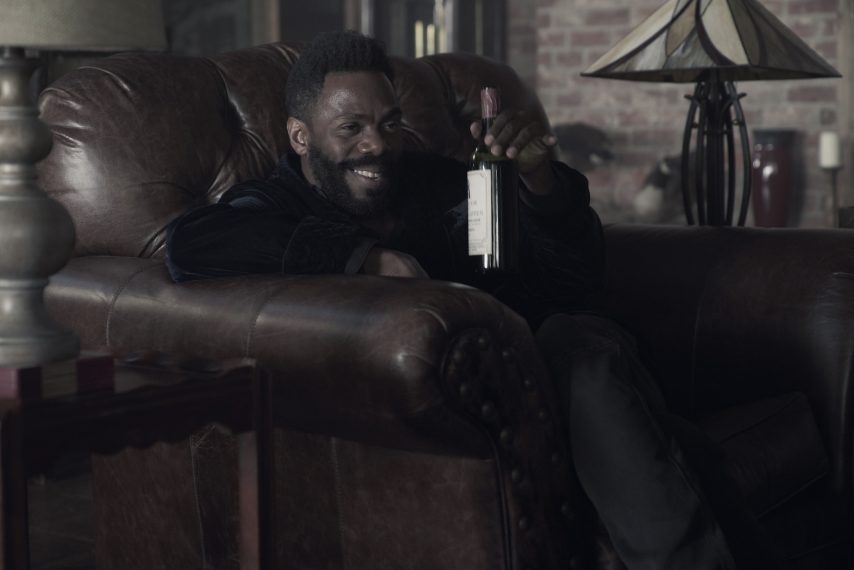
He went on a revenge mission and I think all of those things are contributing to his sense of there being no way forward other than to hole up in this mansion and exist in the trappings of his former life. He has that scene with John Dorie at the end, in the car, where he says “I used to be a millionaire. Everybody used to be something.” And what does any of that matter now? There’s no future, we don’t have anything to go forward now, so what’s the point? And I think that is the big question Strand is going to have to grapple with going forward: what purpose do I have in this world, and what role can I serve for these people around me, many of whom I don’t feel I have a connection to?
What about John and June’s journey through the season, and in this episode? What’s coming up for them?
Goldberg: We’ve seen many different sides to June, under different names…the impression of the person that Laura was, at the cabin, and the version of her that Naomi was, at the stadium, are very different people. And June is reconciling those two things inside of herself, and she really fears now that she and John Dorie are reunited, it should be a happy ending for them but her fear is that John doesn’t really know her because she didn’t really present the full “her” to him at the cabin. And it’s her struggle in the back half of the season, kind of reconciling her past and these different people she has been and has been forced to be because of the emotional trauma that she’s gone through, and what she felt like she needed to do to survive. Whether she can reconcile all those things and whether John will accept that in her is a question that is going to drive their relationship for the back half.
John is still maintaining a pretty optimistic outlook — it’s very sweet when he talks about going to the cabin with Charlie and June. Is he going to stay that optimistic throughout the back half, or are we going to see that optimism tarnished?
Chambliss: We do find him in a very optimistic place. Things are about to get a lot harder for these characters when the storm hits, and there’s a lot more to come in the aftermath of the storm. We can definitely say John Dorie’s optimism will be tested, and how he comes out after that…is something we’ll find out as the story unfolds.
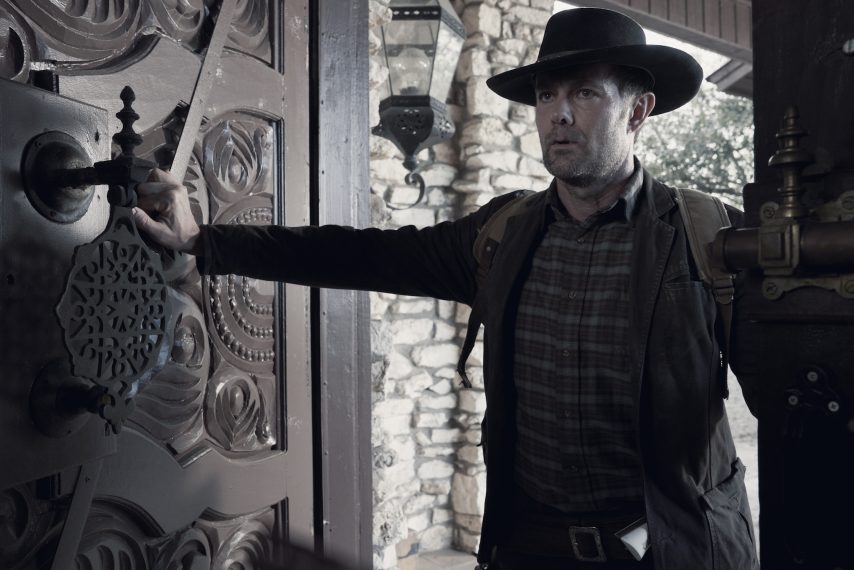
What can you tease about the dynamics of people who are trapped together during this storm? Because it’s characters who don’t really know each other very well…
Goldberg: One of the things that we’re excited about with the back half of the season is exploring the pairings of these characters that have not otherwise spent a lot of time together on the show. They’ve been put into a situation, in this case the storm, where there’s tremendous physical obstacles from the storm itself but also the interplay between these pairings bringing out entirely different sides of these characters, and how they affect each other and how the things that they’re wresting with are amplified by the people they end up with during the storm. Their struggle to overcome the things both internal and external that they’re dealing with is very much just a part of the fabric of the storytelling.
Each of you, in three words: how would you describe this back half of the season?
Chambliss: Strange, funny, hopeful.
Goldberg: Stormy, esoteric, and beer. [Laughs]
Fear the Walking Dead, Sundays, 9/8c, AMC
